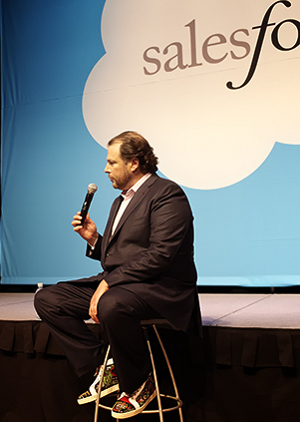Salesforce.com Marketing Cloud: Will CMOs get the message?


Salesforce.com unveiled its Marketing Cloud ecosystem last September, but a number of challenges still stand between the software-as-a-service giant and its goal of becoming a leader in social marketing.
Philip Carnelley, research director at analyst firm PAC UK believes the Marketing Cloud holds a central position in Salesforce's overall business strategy.
"This is going to be the flagship, the big message. Everybody knows about Salesforce automation, even if they haven't really bought into it. It's a known quantity. There's nothing sexy or exciting about it anymore. But one of the big buzzwords of 2013 is customer engagement and [the Marketing Cloud] is at the heart of that," he said.
"This is what makes them — they think — more modern, more interesting, better than anybody else in all the areas of sales, service and marketing."
Although the Marketing Cloud offers Salesforce opportunities to upsell and cross-sell, it also presents the firm with challenges, including how to target a marketing audience and how to adapt the platform geographically and by sector, according to Carnelley.
"Now that marketing is part of the supply chain, it seems fairly clear that the kind of people who are likely to sign the cheque for this kind of stuff are not the head of sales, not the COO and probably not the CIO either — most likely it's the CMO. Salesforce needs to reach out to those and that's new territory for them to some extent," Carnelley said.
Role of Radian6 and Buddy Media
At the heart of the Marketing Cloud is the integration of technology from Salesforce's acquisitions of social-media analysis and engagement firm Radian6 and social-marketing platform Buddy Media.
Carnelley argued that, apart from the software capabilities these companies brought with them, they have also given Salesforce a head start in targeting marketing directly.
"They'd already got clients and likely had been bought by the head of marketing or someone working for them," he said.
Read this
Alternatively, Salesforce needs to collaborate with a new type of partner rather than the traditional systems integrators.
"Marketing people work with creative or media agencies — Salesforce also need to work with those guys who actually do a lot of this stuff on behalf of their clients," he said.
Salesforce, which has described the Marketing Cloud as the "world's only integrated social marketing platform", is also aware of the need to address the issue of the global variations in the use of social media and variations in the popularity of the various networks.
For example, Carnelley said Salesforce promotes the Marketing Cloud's dashboards and its ability to use Facebook for organising campaigns or adverts.
"But in Russia they're not particularly bothered by Facebook and in China they use something else again. Salesforce will just have to cover all the bases," he said.
Carnelley said Salesforce always call itself the CRM company, which supposedly covers sales, service and marketing. Actually, more than half its business is about salesforce automation.
"That's really where they've made their money — in automating or supporting the sales department. More recently, they've been doing quite well in service, selling more solutions to people who are doing customer service and linking that back to sales. But they've never really actually done much on the marketing side," he said.
"Now in the new e-commerce-driven world marketing is part of the supply chain."
According to Carnelley, other providers — such as IBM and Adobe — offer competing products, but Salesforce has an advantage in the degree of integration it can offer.
"The [Salesforce] products themselves are quite good but also they do have this potential to integrate into the service and sales part. IBM and Adobe don't have a salesforce-automation product. This is one of the ways Salesforce are going to stand out — with the integration story," he said.
In terms of integration, the principal rival is Oracle, Carnelley said.
"They have all the pieces as well. So there's only really one other company because SAP do salesforce automation but they don't have the marketing part. So it's only Oracle that offer this across sales, service and marketing."